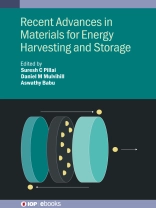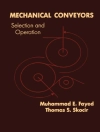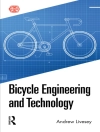Materials which can generate, store and transmit energy are of vital importance for a sustainable society. This book endeavours to highlight new research and developments in all aspects of material synthesis, processing, characterization, and the performance of functional energy materials, as well as their integration into existing and emerging energy-related technologies. Rather than delving deeply into the physics and chemistry of energy conversion and storage, the book elucidates the different materials utilized in this field, breaking down their basic principles of operation and explaining the benefits they offer. Materials chemistry, different methods of synthesis, and the properties of energy materials used in technologies for energy conversion and energy storage are all discussed. This book examines various material systems and their composites for energy applications from a beginner’s perspective all the way up to the most advanced research and development.
- Highlights recent advances in energy conversion, storage, and applications from a materials standpoint
- Examines various material systems and their composites for cutting-edge energy applications from a beginner’s perspective all the way up to the most advanced research and development
- Discusses properties of various energy materials and methods to improve device performance
- Describes applications including flexible energy harvesting and storage devices, sensors, energy storage batteries, fuel cells, photovoltaics and more
- Discusses the challenges and future perspectives of energy materials
Spis treści
1) Energy harvesters: Triboelectric, piezoelectric, thermoelectric and flexoelectric
2) Electrocatalysts for energy conversion and storage
3) Fuel cell materials
4) Battery and supercapacitors
5) Photocatalysts for water splitting
6) Hydrogen production and storage
7) Organic and inorganic photovoltaics
8) Challenges and opportunities in functional energy materials for storage and conversion
O autorze
Suresh C. Pillai is the Director of the Health and Bio-Medical Research Centre and the head of Nanotechnology and Bio-Engineering Research Group at Atlantic Technological University. He obtained his Ph D in Nanotechnology from Trinity College Dublin and performed postdoctoral research at California Institute of Technology, USA. He returned to Trinity College Dublin as a Research Fellow before joining CREST-DIT as a Senior Scientist in 2004 and joining IT Sligo in 2013. He is an elected fellow of the UK’s Royal Microscopical Society (FRMS) and the Institute of Materials, Minerals and Mining (FIMMM). He has also completed an executive MBA from Dublin City University.
Daniel M. Mulvihill is Senior Lecturer in Mechanical Engineering at University of Glasgow. He completed a D.Phil. in Engineering Science at the University of Oxford in 2012, and subsequently undertook postdoctoral research at the University of Limerick, EPFL Switzerland and the University of Cambridge prior to joining Glasgow in 2016. His interests are mainly focused on materials engineering, tribology and materials for energy applications. Dr Mulvihill is a former Institution of Mechanical Engineers (IMech E) Tribology Trust Bronze Medalist (2013). He presently leads a major £1.5M EPSRC project (EP/V003380/1) on next generation textile triboelectric nanogenerators.
Aswathy Babu is an Assistant Lecturer at Atlantic Technological University, Sligo, Ireland. She obtained her Ph.D. in Chemistry from University of Kerala, India in 2015. She worked as a KSCSTE post-doctoral fellow at CSIR-NIIST, India prior to joining ATU-Sligo as a post-doctoral researcher under SFI-EPSRC funding. Her research is in the area of energy materials, particularly the development of textile triboelectric nanogenerators for wearable electronic applications and developing functional nanomaterials for advanced oxidation processes.












